Access Resource Kit (ARK) - Disability Services Commission
Access Resource Kit (ARK) - Disability Services Commission
Access Resource Kit (ARK) - Disability Services Commission
You also want an ePaper? Increase the reach of your titles
YUMPU automatically turns print PDFs into web optimized ePapers that Google loves.
ACCESS PROVISION REQUIREMENTS<br />
LEGISLATION, CODES & STANDARDS<br />
Western Australian Equal Opportunity Act (1984)<br />
The Western Australian Equal Opportunity Act (1984) was amended in 1988 recognising<br />
that people with disabilities require and are entitled to the same level of service as is<br />
available to other members of the community. The amendment to the Act makes it<br />
unlawful for a person to discriminate against any person on the grounds of impairment.<br />
Under the legislation, an action is regarded as being discriminatory if a person with an<br />
impairment is treated less favourably than others in the same or similar circumstances.<br />
Impairment is defined as any condition existing at birth or from an illness or injury. It<br />
includes defects or disturbances in the normal structure or functioning of a person’s body<br />
or brain, or any illness which impairs a person’s thought processes, perceptions of reality,<br />
emotions or judgement, or which results in disturbed behaviour. It also includes<br />
impairments which existed in the past and no longer exist. If a person believes they have<br />
been discriminated against by a public agency because of their impairment, they have the<br />
right to complain to the <strong>Commission</strong>er of Equal Opportunity in Western Australia.<br />
Commonwealth <strong>Disability</strong> Discrimination Act (1992)<br />
The <strong>Disability</strong> Discrimination Act (1992)(DDA) is a Commonwealth Act which seeks to<br />
provide uniform protection against discrimination based on disability for everyone in<br />
Australia. Section 31 of the Act also provides for the formulation of “disability standards” in<br />
relation to public transport, education, accommodation, employment and Commonwealth<br />
programs. Once a standard has been approved it has the force of law. Under the Act<br />
discrimination in the areas of employment, education, access to premises,<br />
accommodation, buying or selling land, activities of clubs and incorporated associations,<br />
sport, administration of Commonwealth laws and programs and the provision of goods and<br />
services is unlawful. A person who believes they have suffered discrimination may make a<br />
complaint to the Human Rights and Equal Opportunity <strong>Commission</strong> (HREOC). HREOC<br />
complaint decisions can be accessed on the web page<br />
hreoc.gov.au/disability_rights/decisions/html<br />
While it is not compulsory, public authorities can choose to prepare and implement action<br />
plans under Section 60 of the DDA (1992). A disability service plan may also qualify as an<br />
action plan under the Commonwealth legislation. Lodging an action plan can help public<br />
authorities if complaints alleging discrimination on the basis of disability are made to<br />
HREOC.<br />
Heritage Buildings and the <strong>Disability</strong> Discrimination Act<br />
The report <strong>Access</strong> to Heritage Buildings for People with Disabilities states<br />
“ The view of the Human Rights and Equal opportunity <strong>Commission</strong> is ‘that the <strong>Disability</strong><br />
Discrimination Act 1992 will override commonwealth/state/territory heritage legislation in<br />
the event of any inconsistencies’”<br />
Appendix B (Aust Standards updated February 2011) 4.8


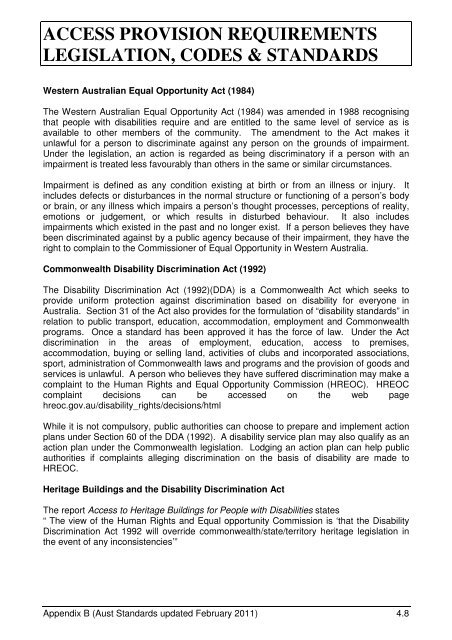

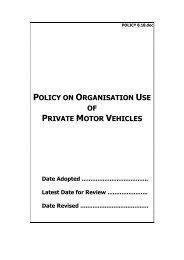
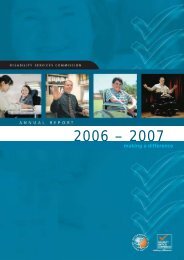

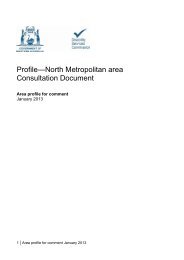
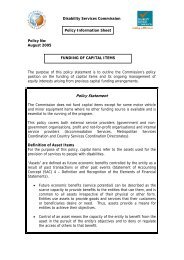
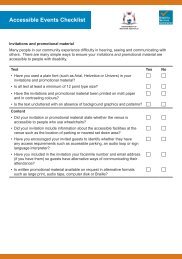
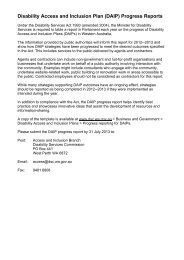
![Heerarka Adeegyada Naafada [PDF 102 kB] - Disability Services ...](https://img.yumpu.com/22096139/1/184x260/heerarka-adeegyada-naafada-pdf-102-kb-disability-services-.jpg?quality=85)

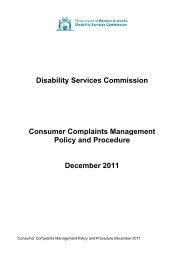
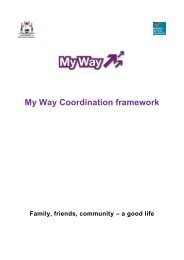

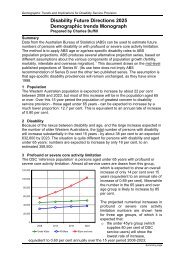
![معايير خدمات الإعاقة [PDF 297 kB] - Disability Services Commission](https://img.yumpu.com/22096120/1/184x260/-pdf-297-kb-disability-services-commission.jpg?quality=85)